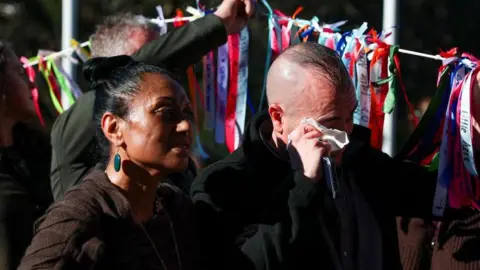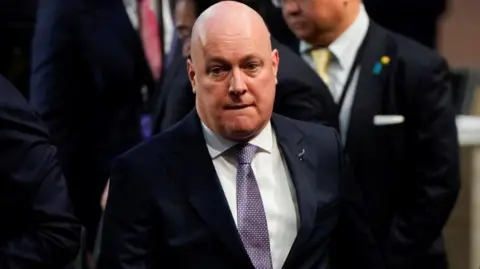New Zealand landmark report finds 200000 suffered abuse in care
Almost one in three people in NZ care was abused
Getty Images
The publication of the commission's final report on Wednesday follows a six-year investigation into the experiences of nearly 3,000 people

Some 200,000 children, young people and vulnerable adults suffered abuse while in state and faith-based care in New Zealand over the last 70 years, a landmark investigation has found.
It means almost one in three children in care from 1950 to 2019 suffered some form of abuse, including being subject to rape, electric shocks and forced labour, according to the Abuse in Care Royal Commission of Inquiry.
The publication of the commission's final report follows a six-year investigation into the experiences of nearly 3,000 people.
Prime Minister Christopher Luxon apologised for the findings, calling it "a dark and sorrowful day in New Zealand's history as a society".
The inquiry was New Zealand's biggest and most expensive to date, costing about NZ$170m ($101m; £78m).
Many of those abused have come from disadvantaged or marginalised communities, including Māori and Pacific people, as well as those with disabilities.
The findings come as vindication for a people who have found themselves facing down powerful officialdom, the state, and religious institutions - and often struggling to be believed.
Faith-based institutions often had higher rates of sexual abuse than state care, the inquiry found.
Civil and faith leaders fought to cover up abuse by moving abusers to other locations and denying culpability, with many victims dying before seeing justice, the report said.
Weighing 14kg, it was brought together over 100 days of public hearings - starting back in 2018.
Speaking at its launch, the then Prime Minister Jacinda Ardern said it was a "chance to confront our history and make sure we don’t make the same mistakes again".

More than 2,300 survivors spoke to the inquiry, which found that in most cases, "abuses and neglect almost always started from the first day".
One survivor, Anna Thompson, told the commission how she was physically and verbally abused at a faith-based orphanage.
"At night, the nuns would strip my clothes off, tie me to the bed face down, and thrash me with a belt with the buckle. It cut into my skin until I bled and I couldn’t sit down afterwards for weeks," she said in testimony published in the report.
Jesse Kett spoke of how he was beaten and raped by staff in a residential school in Auckland when he was eight years old - recounting in his testimony that other staff members would sometimes watch the abuse happen.
Moeapulu Frances Tagaloa was abused by a priest for two years from the age of five in the 1970s.
"He was a popular, well-known teacher," she said.
"But he was also a paedophile and unfortunately there were other little girls that he abused."
Ms Tagaloa now works to help other survivors and has called for all 138 recommendations included in the report to be implemented.
The report found that Māori and Pacific survivors endured higher levels of physical abuse, and were often "degraded because of their ethnicity and skin colour".
It also found that children and people in foster care experienced the highest levels of sexual abuse among various social welfare care settings.
"It is a national disgrace that hundreds of thousands of children, young people and adults were abused and neglected in the care of the state and faith-based institutions," the report said.
"Many survivors died while they were in care or by suicide following care. For others, the impacts of abuse are ongoing and compounding, making everyday activities and choices challenging," it added.

Prime Minister Luxon said: "We should have done better, and I am determined we will do so.
"To every person who took part, I say thank you for your exceptional strength, your incredible courage and your confronting honesty. Because of you, we know the truth about the abuse and trauma you have endured," he said, describing many of the stories as horrific and harrowing.
"I cannot take away your pain, but I can tell you this: you are heard and you are believed."
He added that it was too soon to reveal how much the government expected to pay victims in compensation. He said he would offer a formal apology on 12 November.
Speaking to the BBC, Grant Robertson, a former deputy prime minister who was involved in commissioning the report, said it had been a "long time coming".
He said like many New Zealanders, he felt "a great sense of shame" and "an appreciation of the depth of hurt that’s felt by survivors, and also with a desire that we make good on what is a horrific situation".
According to the report, the economic cost of this abuse and neglect has been estimated to be anywhere from NZ$96bn to $217bn, taking into consideration negative outcomes including increased mental and physical healthcare costs, homelessness and crime.
On Wednesday, dozens of care abuse survivors took part in a march to parliament before the inquiry was released.
One survivor called the report "historic".
"For decades they told us we made it up," Toni Jarvis told news agency Reuters. "So this today is historic and it's an acknowledgement. It acknowledges all the survivors that have been courageous enough to share their stories."
Reuters
Prime Minister Christopher Luxon will formally apologise for the abuse later this year
Academic Dr Rawiri Waretini-Karena, who was a witness in the inquiry, had earlier spoken about the "pipeline from state care to prison".
Dr Waretini-Karena, who spent 10 years in prison, told the inquiry about abuse he suffered as a child in a boys' home.
"When I walked into the prison yard for the first time as a teenager, having never been there before - I already knew 80% of the men in there. We'd spent the last 11 years growing up together in state care," he wrote in an opinion piece for Radio New Zealand.
"That's when I knew there was a pipeline to prison; a pipeline that has spent decades sweeping up and funnelling Māori children from state care to prison."
Dr Waretini-Karena added that the Royal Commission's report acknowledged "that whilst we are responsible for our actions, we are not responsible for the hidden mechanisms that operate within the environment we are born into, privileging one faction at the expense of the other".

















































